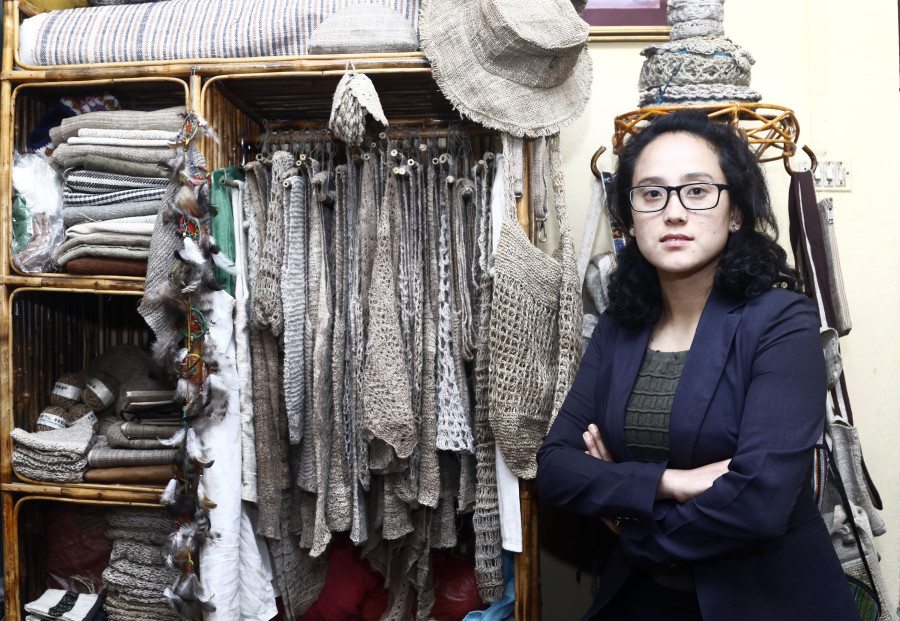Interviews
Mala Thapa Magar: Of all the allo that grows in Nepal, only 10 percent is harvested
In 2009, she started her own company—Himalayan Allo Udhyog, which produces a range of allo products—from raw allo, allo fibre to allo yarn, allo fabric, allo garments, and bags.
Tsering Ngodup Lama
In 2008, when Mala Thapa Magar, a sociology student, started volunteering at an orphanage, her aim was to become a social worker. What she didn’t know was that fate had something completely different in store for her. It was while volunteering at the orphanage that she learned about allo, also known as Himalayan nettle. A year later, in 2009, she started her own company—Himalayan Allo Udhyog, which produces a range of allo products—from raw allo, allo fibre to allo yarn, allo fabric, allo garments, and bags. The company has now grown to indirectly employ around 600 people. In this interview with the Post’s Tsering Ngodup Lama, Magar talks about the challenges she has had to face to reach where she is today, and the potential she sees in allo. Excerpts:
Why allo?
I learned about allo when I was volunteering at an orphanage. One of the founders of the orphanage was into the allo business, and it was through him that I learned about the plant. He exported raw allo to South Korea. But what genuinely interested me in allo was the fact that Nepal is one of the very few countries in the world where allo grows, and it grows abundantly, making Nepal self dependent on allo. I knew that if I get into this business, I wouldn’t have to rely on any other country for raw materials. At that time, many in Nepal didn’t know about the many uses of allo. But globally, allo was already highly sought after by textile companies. In 2009, I started Himalayan Allo Udhyog with an investment of Rs 100,000.
What were some of the challenges that you faced early in the business?
Running a business was completely new to me, and I was doing a lot of things for the first time, and learning as I went. As a small company with limited resources, I had to wear many hats, and I was fine with that, except for marketing. For someone who was very shy and avoided interactions with strangers, marketing was very challenging. I hated it, but I couldn’t afford to hire a marketing representative. I would go and meet prospective clients but would get so nervous that I would barely talk. Perhaps that’s the reason many found it hard to trust me. But gradually, I got better at it.
Another thing that I have learned is that I shouldn’t trust people easily. I have done that and suffered huge financial losses. In 2010, on the recommendation of someone I knew, I supplied Rs 600,000 worth of allo yarn to a carpet manufacturer in Boudha. But months after delivering the yarn, the manufacturer hadn’t paid me. Fed up with calling him and visiting him for nine months, I went to his showroom, picked up a few carpets and went home. The next day, I got a call from the Boudha police station where the carpet factory owner’s brother had registered a case against me for “taking” carpets. I had to go to the police station every day for a week to register myself. As for the carpets, they fetched me a little over Rs 100,000. I must have chosen the cheapest carpets. The person still hasn’t paid me to this day, and I have no hope that he ever will.
Another incident happened between 2014 and 2015. In 2014, I struck a deal with a fabric manufacturer in South Korea. According to the deal, I would supply them with raw allo and they would send me 50 percent of the fabric made out of it. By 2015, I had sent raw allo worth Rs 2.5 million to the fabric manufacturer, but they started asking me to pay money for the fabric, which wasn’t part of the deal.
After almost a year of trying to make the deal work, I gave up. I didn’t get my money back nor did I get my share of fabric.
Those are huge losses for a company that was still finding its footing.
I had taken a loan of Rs 2.5 million to purchase raw allo for the deal, and when I lost the money, it was a huge loss and it left me so upset that I couldn’t work for almost a year. In mid 2016, I picked myself up and resumed working. It wasn’t easy, but I had made up my mind by then that I shouldn’t stop doing what I did because of a loss. I slowly picked up the pieces, and as luck would have it, in 2017, I landed a major client from India. This helped bring some stability to the business, and I started to build on that. When I look back today, I am glad that I mustered the courage to get back and start again. I am glad that I didn’t let a rough patch end my business journey. I am more careful today with business dealings, and most importantly, it has given me the confidence to believe that I can overcome any challenge as long as I don’t give up on myself.
From 2009 to 2019, how has the market changed and how has your company adapted?
In the first few years, only local carpet factories were buying allo yarn, so we only made allo yarns. But in the last two to three years, I have seen a growing demand for ‘Made in Nepal’ garments made from local organic materials. There is also demand for allo yarn and fabric from different countries. Our products too have diversified to cater to the changing market—allo yarn makes up around 50 percent of our production, which we export as well as sell to local carpet manufacturers. We have also started our own allo knitwear, which make up 30 percent of our total production. We sell the knitwear in the local market and export it, too. Allo fabric makes up the remaining 20 percent of our production, which we sell to garment and bag manufacturers in the country.
You source your allo from some of the most remote regions of the country. In a country like Nepal where road access is limited, especially in remote regions, and the human resource shortage, it must be very challenging.
It is. We source our allo from remote villages in the districts of Rolpa, Rukum, Pyuthan, Surkhet, Baitadi, Bajhang and Bajura, where it grows abundantly in the wild. The best quality allo grows at 1,200 metres and above. Most villages are high up in the mountains and do not have road connections. The villagers also have to walk several hours deep into forests to harvest allo. Most of the harvesters are the elderly, so they can only harvest so much. After harvest, they boil it to make raw fibre and then wash and dry it. They make yarn out of the fibre. Our collectors then head to the villages to collect the yarn, carry it on the backs of mules for several hours to transport it to Kathmandu. From harvesting allo to transporting the yarn, it’s all hard work. This is the reason why not enough allo gets harvested and for companies like us that depend on allo, we are always reeling from a shortage of raw material.
Out of the total allo that grows in the country, only 10 percent is harvested. For example, the monthly demand for Himalayan nettle yarn from India stands at 500 to 1,000 kgs from my company alone, but we have only been able to supply an average of 300 kgs.
That’s not good for your business’ sustainability. How do you plan to tackle this?
We are in talks with several villagers who own swathes of forest land in the villages we source our allo from. We are encouraging them to grow allo on a large scale by guaranteeing them that we will purchase all the allo they harvest. It’s a win-win for both sides. We get some control over the supply of our raw materials and the villagers get an extra source of income. It’s a profitable venture because allo grows in the wild easily and once it grows, each plant can be harvested for eight to nine years.
Any future plans?
We are now in the final stages of finalising the location for our factory in Dang. The factory will be ready in a few months. Currently, the villagers boil and wash raw allo themselves. But once the factory is ready, the boiling and washing will be done in the factory itself. We will then transport the fibre to the villagers who will make yarn.
Another dream that I have had for a very long time is to start a Himalayan Allo Udhyog store where people can purchase everything allo—from raw fibre, yarn and fabric to branded garments. This might take a few years, but I am determined to see this dream become a reality.




 14.24°C Kathmandu
14.24°C Kathmandu












